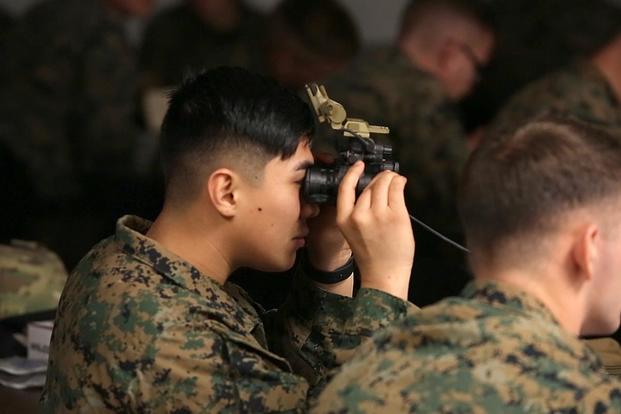The Marine Corps just awarded a $250 million contract for a binocular-style night-vision device to give Marines better depth perception and improved sight in extremely obscured conditions.
The Sept. 6 contract to Harris Corporation will result in 14,000 Squad Binocular Night Vision Goggles that Marine infantry units will start receiving in Spring 2020, according to a Sept. 10 news release from Marine Corps Systems Command.
The new system combines a binocular night-vision device and enhanced clip-on thermal imager. The whole system is lighter than the current AN/PVS-15 night-vision goggles and can detect and recognize targets in extreme low light and bad weather and in the presence of smoke and other obscurants, according to the release.
"Additionally, the use of white phosphor provides a greater capability to see at night with more clarity, giving Marines enhanced situational awareness," Lt. Col. Tim Hough, program manager for Infantry Weapons at SYSCOM, said in the release.
Related: Troops of the Future May Ditch Night-Vision Goggles in Favor of Eye Injections
Meanwhile, the Army is preparing to field its new Enhanced Night Vision Goggle-Binocular (ENVG-B), which features a dual-tube technology that equips soldiers with infrared and thermal capability.
The Army awarded a $391 million contract in June 2018 to L3 Technologies to build the service's ENVG-Bs.
Marines recently joined soldiers in a limited-user evaluation, known as a Soldier Touchpoint, to further evaluate the ENVG-B in field conditions at Fort Drum, New York.
The Corps began looking for the newer binocular-style night-vision device last year and bought 1,300 sets under an existing Defense Logistics Agency contract for field testing, the release states.
"We made the investment to procure the 1,300 systems and fielded them to two infantry battalions, so we already had a good, robust understanding of the technology we were chasing," said Roberto Gonzalez, team lead for Combat Optics at SYSCOM. "That allowed us to quickly get through the source selection process [for this contract]."
Using a full-and-open competition, the Marine Corps also achieved approximately $70 million in savings across the Future Years Defense Program, the release states.
"Awarding this SBNVG contract and fielding these systems to the warfighter is one more step toward increasing the command and control, lethality and ability of the infantry squad to overwhelm our adversaries," Hough said.
-- Matthew Cox can be reached at matthew.cox@military.com.
Read more: The Air Force Just Dropped 80,000 Pounds of Bombs on Island 'Infested' with ISIS Fighters











